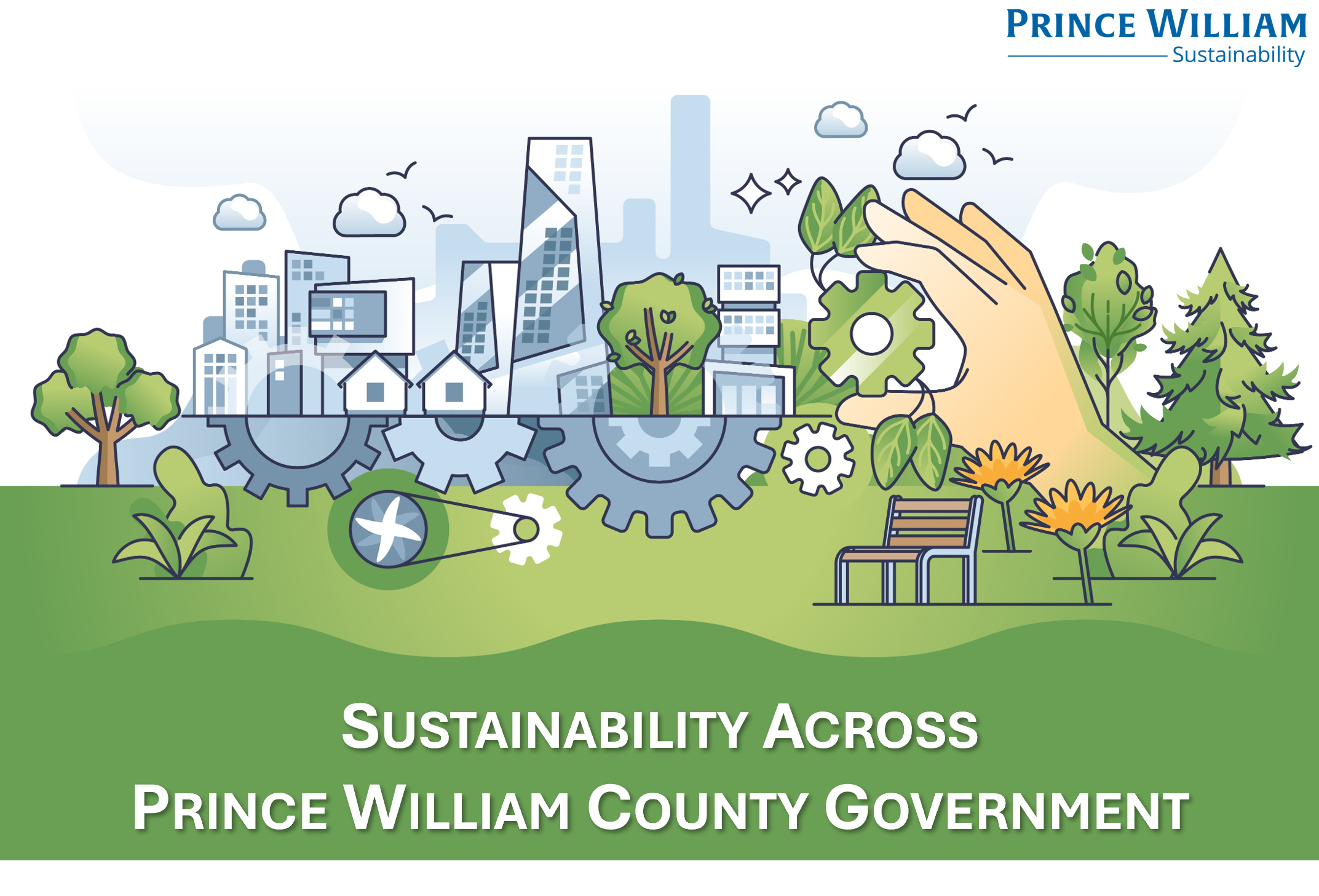Sustainability Across Prince William County Government: PWPL Has Gone Green!

Sustainability means meeting our community’s needs today without compromising the ability of future generations to meet their needs. Many Prince William County Government agencies are taking action to create a sustainable community. The Office of Sustainability wants to highlight these efforts and showcase how Prince William County government agencies are incorporating sustainability into their operations.
Committing to a Greener Future: Sustainable Actions at Prince William Public Libraries
Prince William Public Libraries (PWPL) has committed to a greener future by taking sustainable actions and providing opportunities for staff and the community to collaborate to make positive change. From transforming unwanted plastic bags into new benches to installing water bottle filling stations so less plastic is used, PWPL is actively taking steps to go green
PWPL Impact at a Glance
- $86,000 and 877,414 kWh saved
- 2,200 pounds of plastic bags collected
- Six pollinator gardens planted
- 189,043 plastic water bottles avoided as of December 2023
- 211 ink cartridges donated since October 2022
- 1,000 countertop compost kits distributed
PWPL is the hub connecting residents to the power of information, and it believes in the importance of public libraries leading conversations about current topics such as climate change and environmental sustainability. Therefore, PWPL has a comprehensive approach to engaging the Prince William community in programs and conversations that address sustainability efforts.
PWPL collaborates with the American Library Association on its nationwide Resilient Communities: Libraries Respond to Climate Change initiative, offering programs raising awareness about the natural environment and sustainability, providing ideas on how to make lifestyle changes that reduce one’s ecological footprint, and encouraging and inspiring people to be environmental stewards.
Two of the 12 PWPL branches are partners of the Communities Responding to Extreme Weather (CREW), a network of local leaders building grassroots climate resilience through inclusive and hands-on education, service, and planning. Both libraries host literature on climate preparedness and provide education and support during extreme weather events.
Since 2022, library visitors have donated plastic bags as part of Trex’s NexTrex “Recycle Beyond the Bag” initiative. Six PWPL branches have containers for visitors to drop off plastic bags, and once enough bags are collected, Trex creates benches made from 100% recycled materials. Thanks to the community’s donations, PWPL has three benches to enjoy in our outdoor spaces and a fourth on the way. Since the beginning of the program, more than 2,200 pounds of plastic bags have been collected.
Installing water bottle refill stations at all library buildings has also reduced the amount of plastic in landfills. Every time a library visitor uses the water bottle refill station, it records how many plastic bottles have been saved. As of December 1, 2023, more than 189,043 plastic water bottles have not gone into area landfills thanks to people using the refilling stations.
PWPL also collaborates with the Prince William County Public Schools on a printer ink cartridge recycling collection program. Since October 2022, more than 211 ink cartridges have been donated.
Simple yet substantial changes can also positively impact sustainability and the environment. In recent years, PWPL has been switching to LED lights, which use less energy and last longer. The switch has saved PWPL more than $86,000 and a cumulative 877,414 kilowatt-hours (kWh). PWPL has also begun using “smarter chemical” cleaning supplies to eliminate hazardous chemical use at our libraries. These supplies are safer for our staff and visitors and have a lower environmental impact, reducing the amount of harmful substances released into the environment.
PWPL offers various environmental programs for all ages to raise awareness of the environment and sustainability. It also provides additional resources and information, focusing on sustainability and environment-related science, technology, engineering, art, and math (STEAM) activities.
Library outdoor areas have been transformed to be more environmentally friendly. Six libraries now have pollinator gardens that offer opportunities for nature to thrive and for the public to enjoy and be inspired. PWPL’s four Story Trails couple literacy with exercise, promote overall well-being, encourage people to spend time outdoors, and appreciate nature. Central Green, an outdoor space at Central Library, has various features for environmental education.
Composters and seed libraries are examples of experiential learning for all ages. People can participate in composting activities and learn how to divert food waste, yard trimmings, and other organic matter from the landfill and compost them instead. PWPL also distributed more than 1,000 countertop compost kits with information on how to get started. All kits were packaged in a reusable tote.
These efforts are a continuation and a culmination of a larger initiative. In 2013, PWPL was the first – and is still the only – library system in Virginia to receive the Virginia Environmental Excellence Program (VEEP) certification.
PWPL was also recognized by the Urban Libraries Council, a professional library organization, with its Top Innovator award for its “Resilient and Responsible Communities” program in the category of “Wellness, Safety, and Sustainability.” The award recognizes transformative programs that address current issues and showcase creative thinking and imaginative applications of library resources.
Listen to a recent episode of PWPL’s award-winning “Important Library Stuff” podcast on its sustainability efforts and visit pwcva.gov/library to stay updated on sustainability programs, resources, and initiatives.
